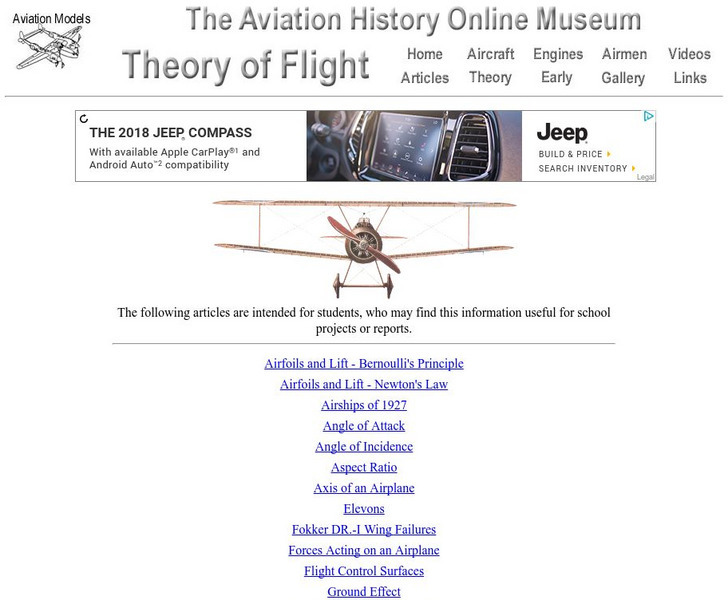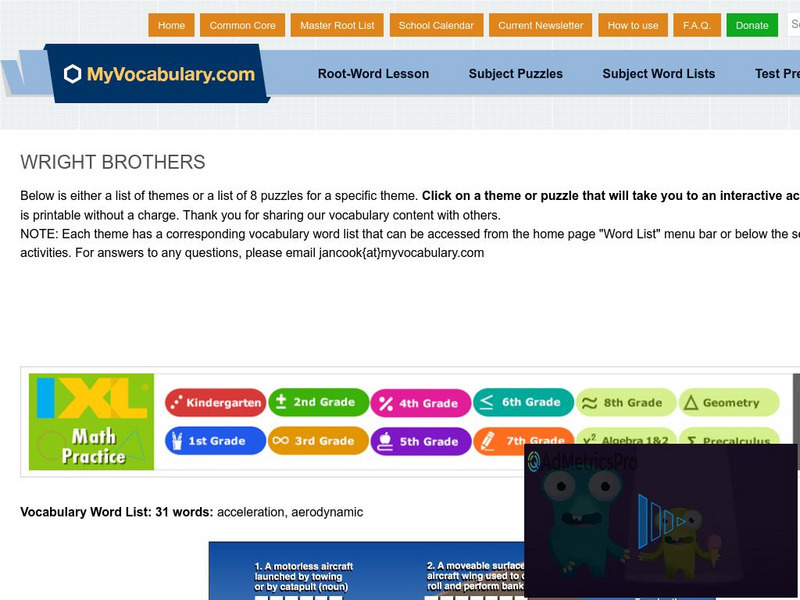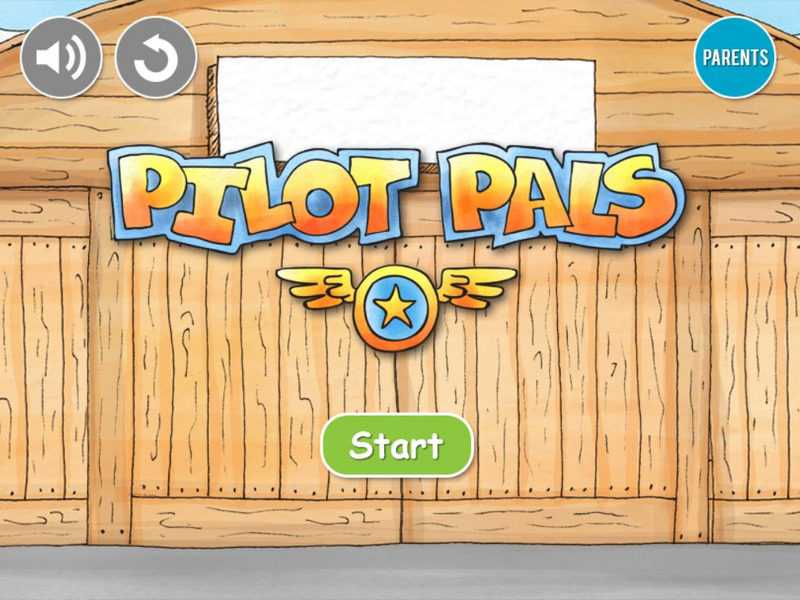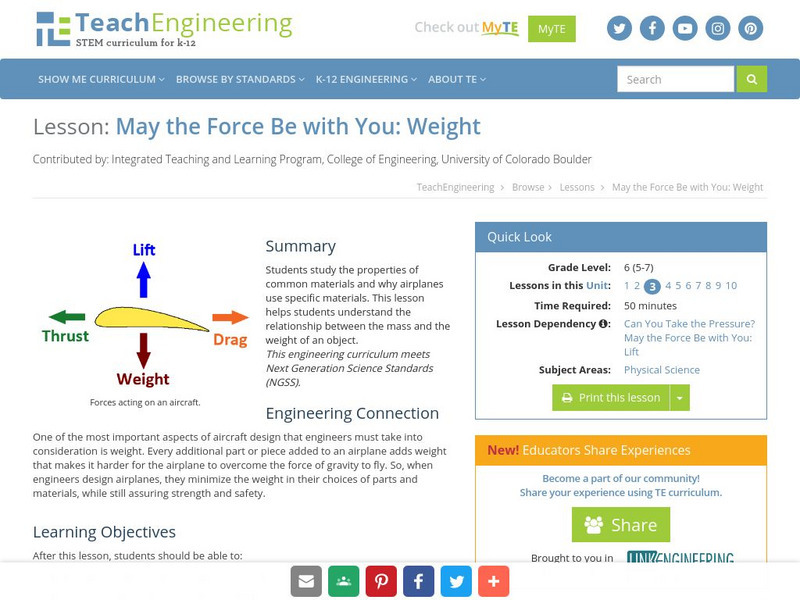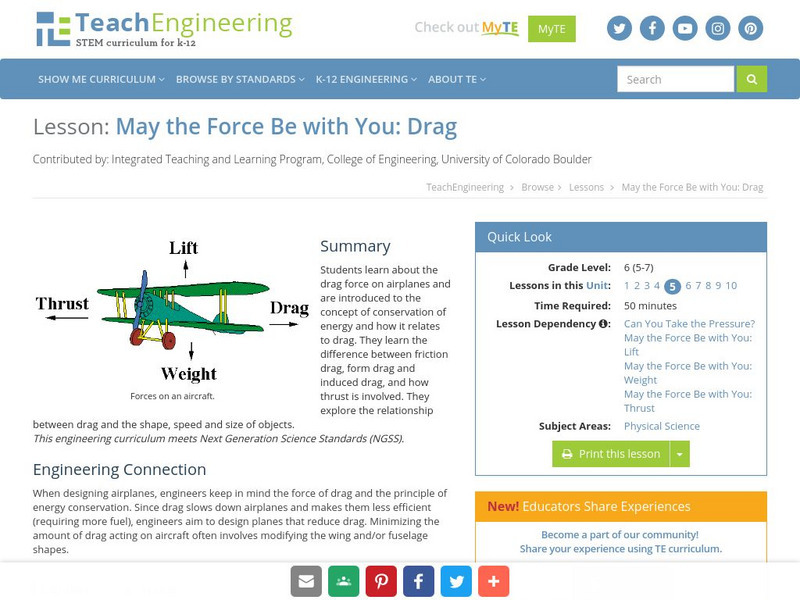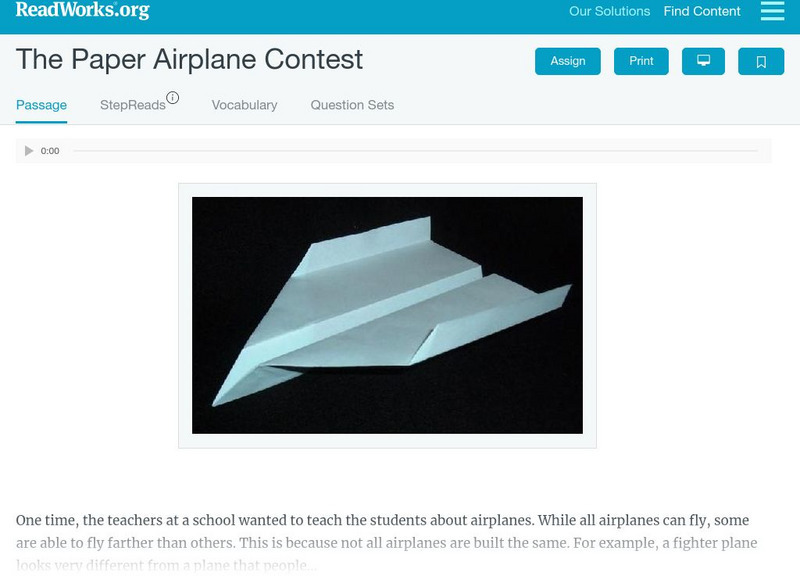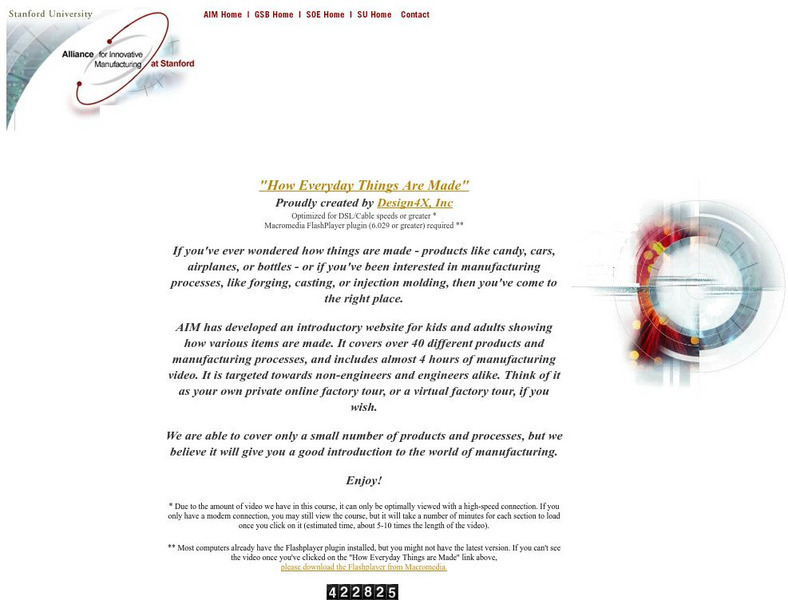PBS
Pbs Learning Media: Airplanes: Designing for Stealth
Explore this NOVA: "Battle of the X-Planes" interactive activity to see how engineers have modified a military plane's sound, shape, and heat emissions to minimize detection.
Exploratorium
Exploratorium: Hoopster
Students create their own airplane using straws and other materials and learn the principles of aerodynamics.
Curated OER
National Park Service: Aviation: From Sand Dunes to Sonic Booms
Features 100 aircraft, airfields, research labs, military installations, battle sites, launch facilities, and other places that tell about people and events that made the U.S. a world leader in aviation. Highlights of this travel...
Other
The Spitfire Emporium: The Machines
A collection of images of vintage aircraft. A few detailed histories are provided.
Other
Aviation Internet Group: Aviation Theory
Collection of articles ranging from basic to advanced on aerodynamics theory.
Other
Federal Aviation Administration: The Main Parts of an Airplane [Pdf]
Two diagrams illustrating the main parts of an airplane - its outer components and the instrument panel.
University of Chicago
Flights Before the Wrights: Octave Chanute, Chicago
A site that chronicles the life of Octave Chanute, an aeronautical engineer involved in flight before the Wright brothers.
University of Chicago
Flights Before the Wrights: Octave Chanute, Chicago
A site that chronicles the life of Octave Chanute, an aeronautical engineer involved in flight before the Wright brothers.
Other
Ken Blackburn: Paper Airplanes
Information on paper airplane designs, history, and contests. Click on "Paper Airplane Aerodynamics" for an analysis of the world record holding paper airplane design.
Vocabulary University
My vocabulary.com: Wright Brothers
This has a variety of vocabulary puzzles and activities using 31 vocabulary words pertaining to the Wright Brothers. It also offers an extensive vocabulary word list for aviation and airplanes.
Smithsonian Institution
National Air and Space Museum: Pilot Pals
Four animated activities introduce early learners to basic concepts about the weather, gears, airplane parts, and rockets.
TeachEngineering
Teach Engineering: Windy Tunnel
The purpose of this activity is to demonstrate Bernoulli's Principle as it relates to winged flight. The students will use computers to see the influence of camber and airfoil angle of attack on the lift.
TeachEngineering
Teach Engineering: Let's Get It There Fast
The purpose of this activity is to demonstrate how aircraft have decreased the amount of time it takes to transport people and cargo. Students will compute the time it takes to travel between two cities for several modes of...
TeachEngineering
Teach Engineering: Can You Take the Pressure?
This lesson introduces students to the concept of air pressure. Students will explore how air pressure creates force on an object. They will study the relationship between air pressure and the velocity of moving air.
TeachEngineering
Teach Engineering: May the Force Be With You: Lift
Students revisit Bernoulli's Principle (Lesson 1 of the Airplanes unit) and learn how engineers use this principle to design airplane wings. Airplane wings create lift by changing the pressure of the air around it. This is the first of...
TeachEngineering
Teach Engineering: May the Force Be With You: Weight
The purpose of this lesson is to help students understand the relationship between the mass and the weight of an object. Students will study the properties of common materials and why airplanes use specific materials.
TeachEngineering
Teach Engineering: May the Force Be With You: Thrust
In this lesson, students will study how propellers and jet turbines generate thrust. This lesson focuses on Isaac Newton's 3rd Law of Motion, which states that for every action there is an equal and opposite reaction.
TeachEngineering
Teach Engineering: May the Force Be With You: Drag
This lesson plan explores the drag force on airplanes. The students will be introduced to the concept of conservation of energy and how it relates to drag. Students will explore the relationship between drag and the shape, speed and size...
TeachEngineering
Teach Engineering: Land! Water! Sky! Oh My!
This lesson focuses on the importance of airplanes in today's society. Airplanes of all shapes and sizes are used for hundreds of different reasons, including recreation, commercial business, public transportation, and delivery of goods,...
Read Works
Read Works: The Paper Airplane Contest
[Free Registration/Login Required] A literary text about a class that has a paper airplane contest. A question sheet is available to help students build skills in reading comprehension.
Other
Allstar Network: Flight
This comprehensive and informative site looks at the history and principles of flight.
Wonderville Media
Wonderville: How Airplanes Fly
Four forces keep an airplane in the sky. These forces are known as lift, weight, thrust, and drag. Learn more about How Airplanes Fly in this well-constructed overview by Wonderville.
Other
All Star: Airfoils
The basic theories of aeronautics are explained through several airfoil activities and animations. Click on Level 2 or 3 for an easier reading level.
Stanford University
Stanford University: How Everyday Things Are Made
If you've ever wondered how things are made - products like candy, cars, airplanes, or bottles - or if you've been interested in manufacturing processes, like forging, casting, or injection molding, then you've come to the right place....





